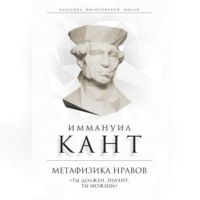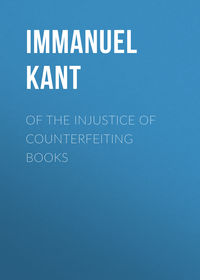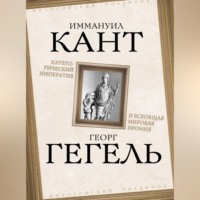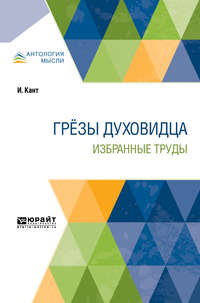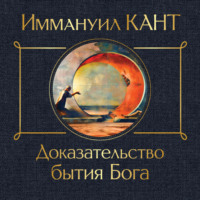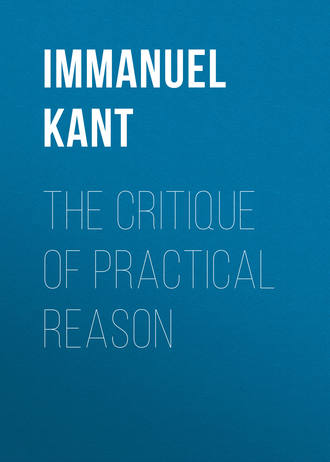 полная версия
полная версияThe Critique of Practical Reason
On the other hand, the moral law, although it gives no view, yet gives us a fact absolutely inexplicable from any data of the sensible world, and the whole compass of our theoretical use of reason, a fact which points to a pure world of the understanding, nay, even defines it positively and enables us to know something of it, namely, a law.
{BOOK_1|CHAPTER_1 ^paragraph 130}
This law (as far as rational beings are concerned) gives to the world of sense, which is a sensible system of nature, the form of a world of the understanding, that is, of a supersensible system of nature, without interfering with its mechanism. Now, a system of nature, in the most general sense, is the existence of things under laws. The sensible nature of rational beings in general is their existence under laws empirically conditioned, which, from the point of view of reason, is heteronomy. The supersensible nature of the same beings, on the other hand, is their existence according to laws which are independent of every empirical condition and, therefore, belong to the autonomy of pure reason. And, since the laws by which the existence of things depends on cognition are practical, supersensible nature, so far as we can form any notion of it, is nothing else than a system of nature under the autonomy of pure practical reason. Now, the law of this autonomy is the moral law, which, therefore, is the fundamental law of a supersensible nature, and of a pure world of understanding, whose counterpart must exist in the world of sense, but without interfering with its laws. We might call the former the archetypal world (natura archetypa), which we only know in the reason; and the latter the ectypal world (natura ectypa), because it contains the possible effect of the idea of the former which is the determining principle of the will. For the moral law, in fact, transfers us ideally into a system in which pure reason, if it were accompanied with adequate physical power, would produce the summum bonum, and it determines our will to give the sensible world the form of a system of rational beings.
The least attention to oneself proves that this idea really serves as the model for the determinations of our will.
When the maxim which I am disposed to follow in giving testimony is tested by the practical reason, I always consider what it would be if it were to hold as a universal law of nature. It is manifest that in this view it would oblige everyone to speak the truth. For it cannot hold as a universal law of nature that statements should be allowed to have the force of proof and yet to be purposely untrue. Similarly, the maxim which I adopt with respect to disposing freely of my life is at once determined, when I ask myself what it should be, in order that a system, of which it is the law, should maintain itself. It is obvious that in such a system no one could arbitrarily put an end to his own life, for such an arrangement would not be a permanent order of things. And so in all similar cases. Now, in nature, as it actually is an object of experience, the free will is not of itself determined to maxims which could of themselves be the foundation of a natural system of universal laws, or which could even be adapted to a system so constituted; on the contrary, its maxims are private inclinations which constitute, indeed, a natural whole in conformity with pathological (physical) laws, but could not form part of a system of nature, which would only be possible through our will acting in accordance with pure practical laws. Yet we are, through reason, conscious of a law to which all our maxims are subject, as though a natural order must be originated from our will. This law, therefore, must be the idea of a natural system not given in experience, and yet possible through freedom; a system, therefore, which is supersensible, and to which we give objective reality, at least in a practical point of view, since we look on it as an object of our will as pure rational beings.
Hence the distinction between the laws of a natural system to which the will is subject, and of a natural system which is subject to a will (as far as its relation to its free actions is concerned), rests on this, that in the former the objects must be causes of the ideas which determine the will; whereas in the latter the will is the cause of the objects; so that its causality has its determining principle solely in the pure faculty of reason, which may therefore be called a pure practical reason.
There are therefore two very distinct problems: how, on the one side, pure reason can cognise objects a priori, and how on the other side it can be an immediate determining principle of the will, that is, of the causality of the rational being with respect to the reality of objects (through the mere thought of the universal validity of its own maxims as laws).
{BOOK_1|CHAPTER_1 ^paragraph 135}
The former, which belongs to the critique of the pure speculative reason, requires a previous explanation, how intuitions without which no object can be given, and, therefore, none known synthetically, are possible a priori; and its solution turns out to be that these are all only sensible and, therefore, do not render possible any speculative knowledge which goes further than possible experience reaches; and that therefore all the principles of that pure speculative reason avail only to make experience possible; either experience of given objects or of those that may be given ad infinitum, but never are completely given.
The latter, which belongs to the critique of practical reason, requires no explanation how the objects of the faculty of desire are possible, for that being a problem of the theoretical knowledge of nature is left to the critique of the speculative reason, but only how reason can determine the maxims of the will; whether this takes place only by means of empirical ideas as principles of determination, or whether pure reason can be practical and be the law of a possible order of nature, which is not empirically knowable. The possibility of such a supersensible system of nature, the conception of which can also be the ground of its reality through our own free will, does not require any a priori intuition (of an intelligible world) which, being in this case supersensible, would be impossible for us. For the question is only as to the determining principle of volition in its maxims, namely, whether it is empirical, or is a conception of the pure reason (having the legal character belonging to it in general), and how it can be the latter. It is left to the theoretic principles of reason to decide whether the causality of the will suffices for the realization of the objects or not, this being an inquiry into the possibility of the objects of the volition. Intuition of these objects is therefore of no importance to the practical problem. We are here concerned only with the determination of the will and the determining principles of its maxims as a free will, not at all with the result. For, provided only that the will conforms to the law of pure reason, then let its power in execution be what it may, whether according to these maxims of legislation of a possible system of nature any such system really results or not, this is no concern of the critique, which only inquires whether, and in what way, pure reason can be practical, that is directly determine the will.
In this inquiry criticism may and must begin with pure practical laws and their reality. But instead of intuition it takes as their foundation the conception of their existence in the intelligible world, namely, the concept of freedom. For this concept has no other meaning, and these laws are only possible in relation to freedom of the will; but freedom being supposed, they are necessary; or conversely freedom is necessary because those laws are necessary, being practical postulates. It cannot be further explained how this consciousness of the moral law, or, what is the same thing, of freedom, is possible; but that it is admissible is well established in the theoretical critique.
The exposition of the supreme principle of practical reason is now finished; that is to say, it has been shown first, what it contains, that it subsists for itself quite a priori and independent of empirical principles; and next in what it is distinguished from all other practical principles. With the deduction, that is, the justification of its objective and universal validity, and the discernment of the possibility of such a synthetical proposition a priori, we cannot expect to succeed so well as in the case of the principles of pure theoretical reason. For these referred to objects of possible experience, namely, to phenomena, and we could prove that these phenomena could be known as objects of experience only by being brought under the categories in accordance with these laws; and consequently that all possible experience must conform to these laws. But I could not proceed in this way with the deduction of the moral law. For this does not concern the knowledge of the properties of objects, which may be given to the reason from some other source; but a knowledge which can itself be the ground of the existence of the objects, and by which reason in a rational being has causality, i.e., pure reason, which can be regarded as a faculty immediately determining the will.
Now all our human insight is at an end as soon as we have arrived at fundamental powers or faculties, for the possibility of these cannot be understood by any means, and just as little should it be arbitrarily invented and assumed. Therefore, in the theoretic use of reason, it is experience alone that can justify us in assuming them. But this expedient of adducing empirical proofs, instead of a deduction from a priori sources of knowledge, is denied us here in respect to the pure practical faculty of reason. For whatever requires to draw the proof of its reality from experience must depend for the grounds of its possibility on principles of experience; and pure, yet practical, reason by its very notion cannot be regarded as such. Further, the moral law is given as a fact of pure reason of which we are a priori conscious, and which is apodeictically certain, though it be granted that in experience no example of its exact fulfilment can be found. Hence, the objective reality of the moral law cannot be proved by any deduction by any efforts of theoretical reason, whether speculative or empirically supported, and therefore, even if we renounced its apodeictic certainty, it could not be proved a posteriori by experience, and yet it is firmly established of itself.
{BOOK_1|CHAPTER_1 ^paragraph 140}
But instead of this vainly sought deduction of the moral principle, something else is found which was quite unexpected, namely, that this moral principle serves conversely as the principle of the deduction of an inscrutable faculty which no experience could prove, but of which speculative reason was compelled at least to assume the possibility (in order to find amongst its cosmological ideas the unconditioned in the chain of causality, so as not to contradict itself) – I mean the faculty of freedom. The moral law, which itself does not require a justification, proves not merely the possibility of freedom, but that it really belongs to beings who recognize this law as binding on themselves. The moral law is in fact a law of the causality of free agents and, therefore, of the possibility of a supersensible system of nature, just as the metaphysical law of events in the world of sense was a law of causality of the sensible system of nature; and it therefore determines what speculative philosophy was compelled to leave undetermined, namely, the law for a causality, the concept of which in the latter was only negative; and therefore for the first time gives this concept objective reality.
This sort of credential of the moral law, viz., that it is set forth as a principle of the deduction of freedom, which is a causality of pure reason, is a sufficient substitute for all a priori justification, since theoretic reason was compelled to assume at least the possibility of freedom, in order to satisfy a want of its own. For the moral law proves its reality, so as even to satisfy the critique of the speculative reason, by the fact that it adds a positive definition to a causality previously conceived only negatively, the possibility of which was incomprehensible to speculative reason, which yet was compelled to suppose it. For it adds the notion of a reason that directly determines the will (by imposing on its maxims the condition of a universal legislative form); and thus it is able for the first time to give objective, though only practical, reality to reason, which always became transcendent when it sought to proceed speculatively with its ideas. It thus changes the transcendent use of reason into an immanent use (so that reason is itself, by means of ideas, an efficient cause in the field of experience).
The determination of the causality of beings in the world of sense, as such, can never be unconditioned; and yet for every series of conditions there must be something unconditioned, and therefore there must be a causality which is determined wholly by itself. Hence, the idea of freedom as a faculty of absolute spontaneity was not found to be a want but, as far as its possibility is concerned, an analytic principle of pure speculative reason. But as it is absolutely impossible to find in experience any example in accordance with this idea, because amongst the causes of things as phenomena it would be impossible to meet with any absolutely unconditioned determination of causality, we were only able to defend our supposition that a freely acting cause might be a being in the world of sense, in so far as it is considered in the other point of view as a noumenon, showing that there is no contradiction in regarding all its actions as subject to physical conditions so far as they are phenomena, and yet regarding its causality as physically unconditioned, in so far as the acting being belongs to the world of understanding, and in thus making the concept of freedom the regulative principle of reason. By this principle I do not indeed learn what the object is to which that sort of causality is attributed; but I remove the difficulty, for, on the one side, in the explanation of events in the world, and consequently also of the actions of rational beings, I leave to the mechanism of physical necessity the right of ascending from conditioned to condition ad infinitum, while on the other side I keep open for speculative reason the place which for it is vacant, namely, the intelligible, in order to transfer the unconditioned thither. But I was not able to verify this supposition; that is, to change it into the knowledge of a being so acting, not even into the knowledge of the possibility of such a being. This vacant place is now filled by pure practical reason with a definite law of causality in an intelligible world (causality with freedom), namely, the moral law. Speculative reason does not hereby gain anything as regards its insight, but only as regards the certainty of its problematical notion of freedom, which here obtains objective reality, which, though only practical, is nevertheless undoubted. Even the notion of causality- the application, and consequently the signification, of which holds properly only in relation to phenomena, so as to connect them into experiences (as is shown by the Critique of Pure Reason) – is not so enlarged as to extend its use beyond these limits. For if reason sought to do this, it would have to show how the logical relation of principle and consequence can be used synthetically in a different sort of intuition from the sensible; that is how a causa noumenon is possible. This it can never do; and, as practical reason, it does not even concern itself with it, since it only places the determining principle of causality of man as a sensible creature (which is given) in pure reason (which is therefore called practical); and therefore it employs the notion of cause, not in order to know objects, but to determine causality in relation to objects in general. It can abstract altogether from the application of this notion to objects with a view to theoretical knowledge (since this concept is always found a priori in the understanding even independently of any intuition). Reason, then, employs it only for a practical purpose, and hence we can transfer the determining principle of the will into the intelligible order of things, admitting, at the same time, that we cannot understand how the notion of cause can determine the knowledge of these things. But reason must cognise causality with respect to the actions of the will in the sensible world in a definite manner; otherwise, practical reason could not really produce any action. But as to the notion which it forms of its own causality as noumenon, it need not determine it theoretically with a view to the cognition of its supersensible existence, so as to give it significance in this way. For it acquires significance apart from this, though only for practical use, namely, through the moral law. Theoretically viewed, it remains always a pure a priori concept of the understanding, which can be applied to objects whether they have been given sensibly or not, although in the latter case it has no definite theoretical significance or application, but is only a formal, though essential, conception of the understanding relating to an object in general. The significance which reason gives it through the moral law is merely practical, inasmuch as the idea of the law of causality (of the will) has self causality, or is its determining principle.
II. Of the Right that Pure Reason in its Practical use has to an Extension which is not possible to it in its Speculative Use.
{BOOK_1|CHAPTER_1 ^paragraph 145}
We have in the moral principle set forth a law of causality, the determining principle of which is set above all the conditions of the sensible world; we have it conceived how the will, as belonging to the intelligible world, is determinable, and therefore have its subject (man) not merely conceived as belonging to a world of pure understanding, and in this respect unknown (which the critique of speculative reason enabled us to do), but also defined as regards his causality by means of a law which cannot be reduced to any physical law of the sensible world; and therefore our knowledge is extended beyond the limits of that world, a pretension which the Critique of Pure Reason declared to be futile in all speculation. Now, how is the practical use of pure reason here to be reconciled with the theoretical, as to the determination of the limits of its faculty?
David Hume, of whom we may say that he commenced the assault on the claims of pure reason, which made a thorough investigation of it necessary, argued thus: The notion of cause is a notion that involves the necessity of the connexion of the existence of different things (and that, in so far as they are different), so that, given A, I know that something quite distinct there from, namely B, must necessarily also exist. Now necessity can be attributed to a connection, only in so far as it is known a priori, for experience would only enable us to know of such a connection that it exists, not that it necessarily exists. Now, it is impossible, says he, to know a priori and as necessary the connection between one thing and another (or between one attribute and another quite distinct) when they have not been given in experience. Therefore the notion of a cause is fictitious and delusive and, to speak in the mildest way, is an illusion, only excusable inasmuch as the custom (a subjective necessity) of perceiving certain things, or their attributes as often associated in existence along with or in succession to one another, is insensibly taken for an objective necessity of supposing such a connection in the objects themselves; and thus the notion of a cause has been acquired surreptitiously and not legitimately; nay, it can never be so acquired or authenticated, since it demands a connection in itself vain, chimerical, and untenable in presence of reason, and to which no object can ever correspond. In this way was empiricism first introduced as the sole source of principles, as far as all knowledge of the existence of things is concerned (mathematics therefore remaining excepted); and with empiricism the most thorough scepticism, even with regard to the whole science of nature( as philosophy). For on such principles we can never conclude from given attributes of things as existing to a consequence (for this would require the notion of cause, which involves the necessity of such a connection); we can only, guided by imagination, expect similar cases- an expectation which is never certain, however often it has been fulfilled. Of no event could we say: a certain thing must have preceded it, on which it necessarily followed; that is, it must have a cause; and therefore, however frequent the cases we have known in which there was such an antecedent, so that a rule could be derived from them, yet we never could suppose it as always and necessarily so happening; we should, therefore, be obliged to leave its share to blind chance, with which all use of reason comes to an end; and this firmly establishes scepticism in reference to arguments ascending from effects to causes and makes it impregnable.
Mathematics escaped well, so far, because Hume thought that its propositions were analytical; that is, proceeded from one property to another, by virtue of identity and, consequently, according to the principle of contradiction. This, however, is not the case, since, on the contrary, they are synthetical; and although geometry, for example, has not to do with the existence of things, but only with their a priori properties in a possible intuition, yet it proceeds just as in the case of the causal notion, from one property (A) to another wholly distinct (B), as necessarily connected with the former. Nevertheless, mathematical science, so highly vaunted for its apodeictic certainty, must at last fall under this empiricism for the same reason for which Hume put custom in the place of objective necessity in the notion of cause and, in spite of all its pride, must consent to lower its bold pretension of claiming assent a priori and depend for assent to the universality of its propositions on the kindness of observers, who, when called as witnesses, would surely not hesitate to admit that what the geometer propounds as a theorem they have always perceived to be the fact, and, consequently, although it be not necessarily true, yet they would permit us to expect it to be true in the future. In this manner Hume's empiricism leads inevitably to scepticism, even with regard to mathematics, and consequently in every scientific theoretical use of reason (for this belongs either to philosophy or mathematics). Whether with such a terrible overthrow of the chief branches of knowledge, common reason will escape better, and will not rather become irrecoverably involved in this destruction of all knowledge, so that from the same principles a universal scepticism should follow (affecting, indeed, only the learned), this I will leave everyone to judge for himself.
As regards my own labours in the critical examination of pure reason, which were occasioned by Hume's sceptical teaching, but went much further and embraced the whole field of pure theoretical reason in its synthetic use and, consequently, the field of what is called metaphysics in general; I proceeded in the following manner with respect to the doubts raised by the Scottish philosopher touching the notion of causality. If Hume took the objects of experience for things in themselves (as is almost always done), he was quite right in declaring the notion of cause to be a deception and false illusion; for as to things in themselves, and their attributes as such, it is impossible to see why because A is given, B, which is different, must necessarily be also given, and therefore he could by no means admit such an a priori knowledge of things in themselves. Still less could this acute writer allow an empirical origin of this concept, since this is directly contradictory to the necessity of connection which constitutes the essence of the notion of causality, hence the notion was proscribed, and in its place was put custom in the observation of the course of perceptions.
{BOOK_1|CHAPTER_1 ^paragraph 150}
It resulted, however, from my inquiries, that the objects with which we have to do in experience are by no means things in themselves, but merely phenomena; and that although in the case of things in themselves it is impossible to see how, if A is supposed, it should be contradictory that B, which is quite different from A, should not also be supposed (i.e., to see the necessity of the connection between A as cause and B as effect); yet it can very well be conceived that, as phenomena, they may be necessarily connected in one experience in a certain way (e.g., with regard to time-relations); so that they could not be separated without contradicting that connection, by means of which this experience is possible in which they are objects and in which alone they are cognisable by us. And so it was found to be in fact; so that I was able not only to prove the objective reality of the concept of cause in regard to objects of experience, but also to deduce it as an a priori concept by reason of the necessity of the connection it implied; that is, to show the possibility of its origin from pure understanding without any empirical sources; and thus, after removing the source of empiricism, I was able also to overthrow the inevitable consequence of this, namely, scepticism, first with regard to physical science, and then with regard to mathematics (in which empiricism has just the same grounds), both being sciences which have reference to objects of possible experience; herewith overthrowing the thorough doubt of whatever theoretic reason professes to discern.



